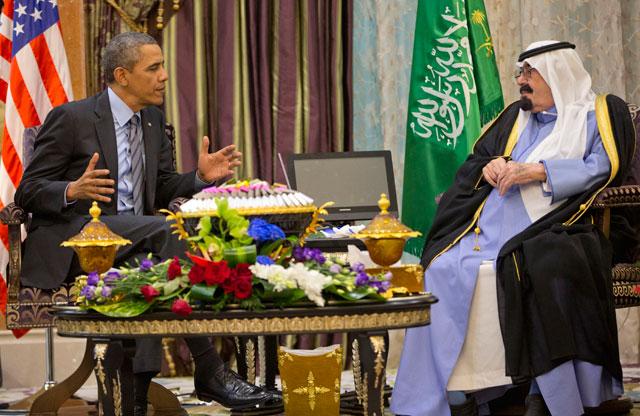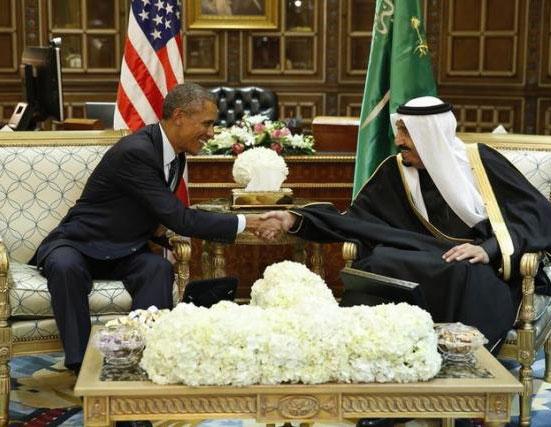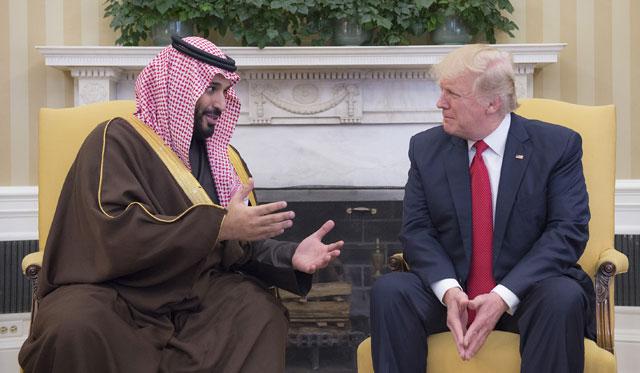You are here
Saudis seek greater US role in Mideast as Obama visits
By AFP - Jan 26,2015 - Last updated at Jan 26,2015
JEDDAH, Saudi Arabia — New Saudi King Salman is expected to use President Barack Obama's stopover on Tuesday to push for greater US involvement in resolving Middle East crises, analysts say.
Obama, accompanied by his wife Michelle, is cutting short a visit to India to convey his condolences after the death of ailing King Abdullah last Friday.
Following the death, Obama in a statement paid tribute to the late king as a bold leader who made an enduring contribution to Middle East peace.
The American president praised King Abdullah's "steadfast and passionate belief in the importance of the US-Saudi relationship”.
But despite the longstanding strategic partnership between the world's biggest oil exporter and one of its major buyers, analysts say Riyadh has grown dissatisfied with what it sees as a lack of US engagement with the region's key issues.
Anwar Eshki, chairman of the Jeddah-based Centre for Strategic and Legal Studies, said "divergences persist" between the two sides.
These differences include the battle against the Islamic State (IS) jihadist group, Yemen, Syria and Libya, Eshki said.
Saudi Arabia and its Gulf neighbours in September joined a US-led coalition conducting air strikes against IS in Syria.
Despite this cooperation, Riyadh thinks "it is necessary to eliminate the underlying reasons" that led to the emergence of IS, chiefly discrimination against Sunni Muslims in Iraq, Eshki said.
White House Deputy National Security Adviser Ben Rhodes confirmed in New Delhi that Yemen's turmoil and the battle against IS would figure on the agenda.
"I'm sure that while we are there, they will touch on some of the leading issues where we cooperate very closely with Saudi Arabia," he said.
"Clearly that would include the continued counter-ISIL campaign where the Saudis have been a partner and have joined us in military operations," he said, using another term for IS.
"That of course also includes the situation in Yemen where we have coordinated very closely with Saudi Arabia and the other countries."
Relations not ideal
Riyadh would like Washington to exercise more pressure to get the protagonists in both Yemen and Libya back to negotiations, Eshki said.
Libya has two rival governments and powerful militias are battling for territory.
In Yemen, on Saudi Arabia's southern border, President Abed Rabbo Mansour Hadi, a key US ally in the fight against Al Qaeda, tendered his resignation last week after Shiite militiamen kidnapped his chief of staff and seized key buildings.
Seen from Riyadh, US Secretary of State John Kerry has failed to achieve a breakthrough on the Israeli-Palestinian conflict, 13 years after the kingdom launched an initiative for peace with Israel, Eshki pointed out.
Ties between Washington and Riyadh have not been at the ideal level in recent years, said Jean-Francois Seznec, a Middle East specialist at Georgetown University in the United States.
"The Saudis at all levels think that the Americans are no longer reliable," said Seznec.
However, he said the Saudis view in "a quite positive way" international negotiations with Iran and a potential agreement on Tehran's controversial nuclear programme.
The US and four other permanent members of the United Nations Security Council face a June 30 deadline for a final deal with Iran.
Tehran insists its nuclear enrichment programme is for domestic energy production and denies pursuing an atomic weapons programme.
Sunni-majority Saudi Arabia and Shiite-dominated Iran are regional rivals.
According to Seznec, the Saudis are convinced that if international powers reach an agreement with Tehran, the Saudis could then strike their own deal with Iran to "restore order" in the region, starting in Syria and Yemen.
Frederic Wehrey, of the US-based Carnegie Endowment for International Peace Middle East Programme, said disagreements between Saudi Arabia and the United States are manageable.
"But the Saudis are still looking for greater collaboration and coordination," he said.
Related Articles
US President Barack Obama sought Friday to allay Riyadh's criticism of his policies on Syria and Iran, telling the Saudi king their two countries remain in lockstep on their strategic interests.
RIYADH — Saudi Arabia's King Salman will meet US President Barack Obama in Washington on Friday, aiming to push him for more support in Riya
RIYADH — US President Donald Trump may not be popular in much of the Muslim world but he has been embraced by Saudi Arabia and, in turn, has


















